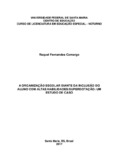| dc.contributor.advisor | Rech, Andréia Jaqueline Devalle | |
| dc.creator | Camargo, Raquel Fernandes | |
| dc.date.accessioned | 2019-05-07T18:44:09Z | |
| dc.date.available | 2019-05-07T18:44:09Z | |
| dc.date.issued | 2017-12-18 | |
| dc.date.submitted | 2017 | |
| dc.identifier.uri | http://repositorio.ufsm.br/handle/1/16440 | |
| dc.description | TCC de Graduação | por |
| dc.description.abstract | The present research results from a work of conclusion of course in Special
Education Night linked to the Education Center of the Federal University of Santa
Maria. The general objective of this research is toanalyze the process of inclusion of
students with high abilities / giftedness of a public elementary school in the city of
Santa Maria, Rio Grande do Sul. As the theoretical assumptions of this research are
the conceptions of the following authors: Alencar & Fleith (2001), Renzulli (2014),
Virgolim (2007), Figueiredo (2002), Ferreira (2006), Carvalho (2004), Freitas & Rech
(2015), Mendes (2006), among others. In the perspective of inclusive education, it
should be pointed out that special education aims to ensure the inclusion of students
with disabilities, global developmental disorders and high skills / giftedness (BRASIL,
2011). The present research was characterized as a qualitative research (GIL, 2008;
CHEMIN, 2012; MALHOTRA, 2006) of the case study type. For the data collection, a
semi-structured interview was used. The Pedagogical Coordinator and the Special
Educator participated in the study. The processes of identification happened through
actions with researchers of university, some projects no longer exist, which means
that the inclusion of these students is not possible. There were some inclusive
activities in the resource room, but these activities can not be considered inclusion
strategies. However, the results pointed out that the school does not adopt specific
procedures and that it is not currently offering AEE for students with AH / SD. One of
the reasons for the exclusion of students with AH / SD at school is due to
misconceptions about the thematic. In order for the school to play its role, it is
necessary a greater effectiveness of pedagogical practices backed by public policies,
as well as the school should promote sensitizations or events to raise awareness
teachers about the inclusion of students with AH / SD, to demystify preconceptions
and myths related to AH / SD. Because these students need a attentive look, so that
they can have their special educational needs met. | eng |
| dc.language | por | por |
| dc.publisher | Universidade Federal de Santa Maria | por |
| dc.rights | Acesso Aberto | por |
| dc.rights.uri | http://creativecommons.org/licenses/by-nc-nd/4.0/ | * |
| dc.subject | Inclusão escolar | por |
| dc.subject | Altas habilidades/superdotação | por |
| dc.subject | Atendimento educacional especializado | por |
| dc.subject | Procedimentos | por |
| dc.subject | Recursos | por |
| dc.subject | Estratégias | por |
| dc.subject | High skills/giftedness | eng |
| dc.subject | School inclusion | eng |
| dc.subject | Specialized educational services | eng |
| dc.subject | Procedures | eng |
| dc.subject | Resources | eng |
| dc.subject | Strategies | eng |
| dc.title | A organização escolar diante da inclusão do aluno com altas habilidades/superdotação: um estudo de caso | por |
| dc.title.alternative | The school organization through the inclusion of the student with high skills/giftedness: a case study | eng |
| dc.type | Trabalho de Conclusão de Curso de Graduação | por |
| dc.degree.local | Santa Maria, RS, Brasil | por |
| dc.degree.graduation | Curso de Licenciatura em Educação Especial Noturno | por |
| dc.description.resumo | A presente pesquisa é resultante de um trabalho de conclusão de curso em
Educação Especial Noturno vinculado ao centro de Educação, da Universidade
Federal de Santa Maria. Tem como objetivo geral analisar o processo de inclusão de
alunos com altas habilidades/superdotação de uma escola pública de Ensino
Fundamental no município de Santa Maria, Rio Grandedo Sul. Como pressupostos
teóricos dessa pesquisa encontram-se as concepções dos seguintes autores:
Alencar & Fleith (2001), Renzulli (2014), Virgolim (2007), Figueiredo (2002), Ferreira
(2006) Carvalho (2004) Freitas & Rech (2015), Mendes (2006), entre outros. Na
perspectiva da educação inclusiva, cabe salientar que a educação especial tem
como objetivo assegurar a inclusão escolar de alunos com deficiência, transtornos
globais do desenvolvimento e altas habilidades/superdotação (BRASIL, 2011). A
presente pesquisa caracterizou-se como uma pesquisa qualitativa (GIL, 2008;
CHEMIN, 2012; MALHOTRA, 2006) do tipo estudo de caso. Para a coleta dos dados
foi utilizada a entrevista semiestruturada. Participaram do estudo a Coordenadora
Pedagógica e a Educadora Especial. Os processos de identificação aconteciam
através de ações com pesquisadores da universidade,alguns projetos não existem
mais, o que significa que a inclusão destes alunos não está sendo possível.
Existiram algumas atividades inclusivas na sala de recursos, mas essas atividades
não podem ser consideradas estratégias de inclusão. Contudo, os resultados
apontaram que a escola não adota procedimentos específicos e que atualmente a
não está ofertando AEE para os alunos com AH/SD. Umdos motivos da exclusão de
alunos com AH/SD na escola é devido a ideias equivocadas acerca da temática.
Para que a escola exerça seu papel é necessária umamaior efetivação de práticas
pedagógicas respaldadas pelas políticas públicas, assim como a escola deve
promover sensibilizações ou eventos para conscientizar os professores sobre a
inclusão dos alunos com AH/SD, desmitificar pré-conceitos e mitos relacionados às
AH/SD. Pois estes alunos carecem de um olhar atencioso, para que assim possam
ter suas necessidades educacionais especiais atendidas. | por |
| dc.publisher.country | Brasil | por |
| dc.publisher.initials | UFSM | por |
| dc.subject.cnpq | CNPQ::CIENCIAS HUMANAS::EDUCACAO::TOPICOS ESPECIFICOS DE EDUCACAO::EDUCACAO ESPECIAL | por |
| dc.publisher.unidade | Centro de Educação | por |



